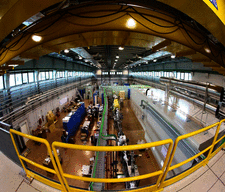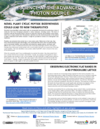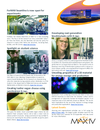issue contents
January 2016 issue
PhotonDiag2015 Workshop special issue
Guest Editors: E. Plönjes, M. Zangrando and D. Cocco

Cover illustration: A view of FERMI, the free-electron laser user-facility located in Trieste, Italy.
facility information
photondiag2015 workshop
Free 

Introductory overview to the special issue papers from the PhotonDiag2015 workshop.
Engineering design, implementation and operation of a new hard X-ray variable-energy single-shot spectrometer for characterizing the LCLS X-ray FEL spectral properties are reported.
Open  access
access
 access
access
A description of the design of an instrument for FEL wavelength monitoring based on photoionization of rare gases is given, as well as a report on calibration and characterization studies.
The filamentation or density depression effect induced by photoabsorption of X-ray free-electron laser pulses in a gas medium operating at a high repetition rate is described.
A new method of beam diagnosis for the FERMI free-electron laser focused beam quality has been developed. The proposed highly reliable and low-cost pixelated phosphor detector provides high-precision detection and is able to measure the actual spot size shot-to-shot with unprecedented micrometrical resolution.
The design and features, as well as the experimental results, of the on-line photon energy spectrometer of the FERMI free-electron laser user facility working in the extreme-ultraviolet and soft X-ray range are reported.
Different types of Hartmann wavefront sensors available at FLASH and their typical application for online measurements of photon beam parameters during mirror alignment are presented.
Open  access
access
 access
access
The challenging specifications for long X-ray mirrors for upcoming free-electron lasers can be achieved, especially for maintaining below 2 nm peak-to-valley shape error along the optical aperture of approximately 1 m-long mirrors.
The manufacturing process of a simple prototype of an adjustable grazing-incidence mirror made of thin glass for applications to X-ray astronomy is shown. The feedback under X-ray illumination is also described.
Open  access
access
 access
access
A new optics beamline and a versatile 11-axes UHV-reflectometer for at-wavelength characterization of real life-sized UV- and XUV-reflection gratings and other (nano-) optical elements has been set up and is in operation at BESSY-II. Azimuthal rotation of samples allows for reflectometry and polarimetry measurements in s- and p-polarization.
A new physical phenomenon is experimentally detected and theoretically explained: the growth of nano-dots on the grazing-incidence mirror surface under irradiation by the free-electron laser FLASH.
When a radiation beam impinges onto a reflection grating with rectangular profile exactly parallel to the grooves, the diffracted intensity is distributed symmetrically with respect to the plane of incidence. High diffraction efficiency was observed far into the keV photon energy range for two symmetrically oriented diffraction peaks of equal intensity, which allows one to use these objects efficiently as amplitude beam splitters, e.g. in delay lines at free-electron laser sources.
The optical design and expected performances of the forthcoming beamline MagneDyn at the FERMI free-electron laser user facility is reported. After discussing the scientific case and the FERMI capabilities the main components of the beamline are described, showing the feasibility for ultra-fast magnetic dynamics experiments in the VUV/soft X-ray range for the future users.
The optical design and expected performances of the TeraFERMI beamline under construction at the FERMI free-electron laser user facility is reported. After discussing the scientific case and the FERMI capabilities, the main components of the beamline as well as the foreseen experiments are described.
An overview is given of current two-dimensional imaging detector developments led by the DESY Photon Science detector group that are targeted for FEL applications.
Open  access
access
 access
access
Considering the second-order spectral correlation function of SASE-FEL radiation allows a real-time observation of the photon pulse duration during spectra acquisition.
Open  access
access
 access
access
The Kirkpatrick–Baez (KB) refocusing mirrors unit at the PG1 beamline at FLASH has been newly designed, developed and fully commissioned. The vertical focal size of the KB optics is measured to be 5.8 ± 1 µm FWHM and the horizontal 6 ± 2 µm FWHM; astigmatism has been minimized to below 1 mm between waist positions. Such a tight focus is essential for the VUV double Raman spectrometer as it serves as an entrance slit for the first monochromator and defines its resolution to a very large extent. The Raman spectrometer is a permanent end-station at the PG1 beamline, dedicated to inelastic soft X-ray scattering experiments.
The experimental setup already available and in development at the FERMI free-electron laser user facility to carry out non-linear four-wave-mixing experiments in the extreme-ultraviolet and soft X-ray range is reported.
lead articles
Free 

Techniques for producing (sub-) picosecond X-ray pulses at synchrotron light sources are reviewed.
research papers
An application of a mid-infrared free-electron laser for protein science is described. The amide-specific free-electron laser irradiation was found to be effective for dissociation of the protein aggregate to the monomer form.
Sub-microradian beam divergence was achieved by the newly installed mirror system in SPring-8/BL29XUL.
The fabrication and performance evaluation of single-crystal diamond refractive X-ray lenses with a paraboloid of rotation form factor for focusing X-rays in two dimensions simultaneously are reported.
A bendable mirror with piezos bonded to the side faces is characterized. The response functions are measured, and effects such as hysteresis, twisting, reproducibility and stability are investigated. Measurements are performed using the BESSY-NOM and a 12 inch-diameter Fizeau interferometer in a grazing-incidence setup.
Open  access
access
 access
access
Complete polarization analysis of the photon beam produced by a dual APPLE-II undulator configuration using a multilayer-based soft X-ray polarimeter is given.
One-dimensional ion beam figuring for one-dimensional synchrotron optics is presented.
The optimization of an efficient plane-grating monochromator for covering the entire soft X-ray range with photon energies up to about 8 keV is described. The instrument is based on the operation of a plane grating in conical diffraction, which can provide high efficiency over a large, and presently rather uncommon, tuning range for grating monochromators.
The first synchrotron X-ray characterization of the Voxtel VX-798, a prototype X-ray pixel array detector featuring a silicon sensor photodiode array of 48 × 48 pixels, each 130 µm × 130 µm × 520 µm thick, coupled to a CMOS readout application specific integrated circuit, is presented.
A mathematical model has been developed for estimating the detective quantum efficiency (DQE) at zero spatial frequency in the tender X-ray energy range for photon-counting detectors; experiments were carried out with a Medipix3RX detector at the Soft X-ray Spectroscopy beamline (D04A-SXS) of the Brazilian Synchrotron Light Laboratory.
Kossel line patterns excited by synchrotron radiation are measured on a NiO single-crystal. The structural information encoded in the line profile is evaluated.
The morphological origins of polarization-dependent anisotropic X-ray scattering have been investigated through simulations and experiment. Interfacial and bulk molecular orientation–composition correlations are found to produce scattering anisotropy from globally isotropic films. The connection between anisotropic signals and underlying morphology is explored.
Open  access
access
 access
access
Coherent diffraction observations from polyhedra crystals at cryotemperature are reported. Information is obtained about the lattice strain and the changes with radiation damage.
High-resolution X-ray diffraction experiments based on synchrotron radiation are used to measure the values of lateral coherence length, vertical coherence length, tilt and micro-strain of GaAs epilayers grown on Si substrate using the conventional Williamson–Hall analysis. Such information could not be obtained on laboratory-based high-resolution X-ray diffraction systems.
Open  access
access
 access
access
The new efficient Monte Carlo procedure for multiple scattering simulation in Compton experiments is presented. The simulation algorithm has proved its advantage in restricted geometry experiments.
Download citation


Download citation


Local structure of Ge quantum dots determined by combined numerical analysis of EXAFS and XANES data
The high sensitivity of XANES to the local symmetry has been utilized to study the structure of as-prepared and annealed Ge quantum dots (QDs) obtained by colloidal synthesis. As-prepared QDs were found to retain diamond-type structure despite a large degree of structural disorder. In annealed Ge QDs, analysis indicates the presence of a crystalline diamond-type core and highly disordered surface.
Open  access
access
 access
access
A new quick-scanning EXAFS (QEXAFS) monochromator, ionization chambers and data acquisition system have been developed and installed at the SuperXAS beamline at the Swiss Light Source to reach a temporal resolution of 10 ms.
Processing of hybrid organic–inorganic thick coatings by hard X-rays enables a fine tuning of the structure and the properties of a material.
An experimental and theoretical investigation of soft X-ray fluorescence radiation collected at the exit of microchannel plates showing the occurrence of channeling for the excited fluorescence radiation inside a medium.
The differential electron yield (DEY)-EXAFS method using a multichannel electron energy analyzer is presented. DEY-EXAFS provides a specific absorption-edge spectrum with no other edges within the EXAFS oscillation (N K-edge for silicon nitride in this study), enabling local structure analysis with Fourier transformation.
The X-ray absorption fine-structure technique complemented with ab initio calculations is used to determine the site occupancy and lattice relaxation around Mo, Ru, Hf, W and Re in Ni3Al.
The growth of Au and Pt nanoparticles from their respective chloride precursors using block copolymer-based reducers has been studied by simultaneous in situ measurement of XAS and UV–Vis spectroscopy at the energy-dispersive EXAFS beamline (BL-08) at INDUS-2 SRS at RRCAT, Indore, India.
Effective setting strategies using Monte Carlo simulation are presented to mitigate the irradiation damage in synchrotron radiation microangiography.
A scheme is proposed for determining the most probable electron density map retrieved from diffraction patterns in coherent X-ray diffraction imaging.
Download citation


Download citation


High-speed synchrotron-based lung imaging was used to measure the penetrance of pressure oscillations imparted at the mouth during a forced oscillation test.
short communications
Open  access
access
 access
access
An inline spectrometer has been developed to monitor each pulse energy of a two-color X-ray beam.
Download citation


Download citation


Open  access
access
 access
access
A nearly on-axis UV–visible absorption spectrometer was developed at SPring-8 that enables spectroscopic analysis of the X-ray-exposed volume of a crystal during X-ray diffraction data collection.
A fast positioning method for brain tumor microbeam irradiations for preclinical studies at third-generation X-ray sources is described.
beamlines
Open  access
access
 access
access
ID16B is a versatile hard X-ray nanoprobe devoted to X-ray nano-analysis. It combines X-ray fluorescence, X-ray diffraction, X-ray absorption spectroscopy and 2D/3D X-ray imaging techniques.
Open  access
access
 access
access
The new energy-dispersive XAS beamline at the European Synchrotron Radiation Facility is presented. A technical description of the beamline (optical scheme, detection, sample environments) is provided and its performance is illustrated with a few recent examples of experiments by different user groups.
Beamline BL2D-SMC for supramolecular crystallography installed with various instruments at Pohang Light Source (Korea) is described.
computer programs
Download citation


Download citation


A new program for the analysis of data from near-edge X-ray absorption spectroscopy was developed at the Australian Synchrotron. This program allows for semi-automated instant correction and analysis to be performed on NEXAFS spectra collected on the soft X-ray beamline at the Australian Synchrotron and will be applicable to other NEXAFS facilities around the world.
current events
Free 



 journal menu
journal menu











































































